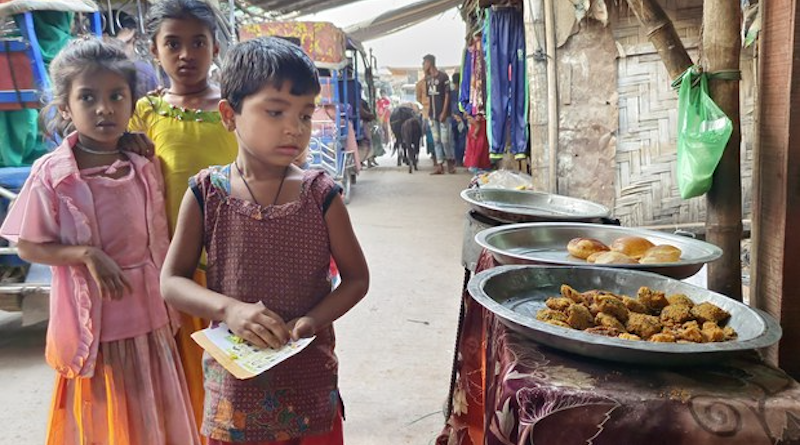UN To Cut Food Rations Again For Rohingya Refugees In Bangladesh
By BenarNews
By Kamran Reza Chowdhury and Abdur Rahman
The United Nations food agency is reducing rations for Rohingya in Bangladesh for the second time this year citing a funds shortage, a move that refugees fear could push them to the brink of starvation.
Starting June 1, the World Food Program will cut food aid to U.S. $8 a month per person from $10 – after having cut the monthly food ration from $12 in March – marking a total decline of 33% to date this year, a Bangladeshi official confirmed on Tuesday.
The WFP last week notified Bangladesh about the further reduction in food aid allocated for Rohingya sheltering at camps in the country’s southeast, Md. Shamsud Douza, Bangladesh’s additional refugee relief and repatriation commissioner, told BenarNews.
“They informed us that fund shortages forced them to further reduce the per head allocation of rations [food aid] amounting to U.S. $8 eight dollars per month from the existing $10. The new allocation will come into effect from June 1,” he said.
“We do not support the reduction of food allocation. It has wider impacts on the people: nutrition, health and others. They could have reduced the allocation in other areas instead of reducing food aid.”
According to a mid-May country brief on Bangladesh on the website of the humanitarian group ReliefWeb, the WFP urgently needs $56 million to restore full rations for the nearly 1 million Rohingya refugees who live in Cox’s Bazar until end-2023.
The March 1 cut – from $12 to $10 – was the first time in six years that the WFP said it was being “forced to cut back” on assistance for the Rohingya, even as it warned back then that deeper cuts may be necessary, if its appeal for another $125 million in funding was not met.
At the time, the WFP said that 45% of Rohingya families were not eating a sufficient diet and malnutrition was widespread in the camps. About 40% of children had stunted growth and 40% of pregnant and breastfeeding women were anemic.
The WFP since 2017 has been providing food and other assistance to refugees who have settled in the sprawling camps in and around Cox’s Bazar. The Rohingya receive food assistance through vouchers, which allow families to choose from more than 40 dry and fresh food items at WFP outlets throughout the camps.
Among the population of the persecuted and stateless Myanmar minority who live in the camps, about 740,000 fled their home country for neighboring Bangladesh amid a brutal military crackdown in 2017.
Also on Tuesday, the U.N. and its humanitarian partners in Bangladesh appealed for $42.1 million in additional funding for the Rohingya refugees and Bangladeshi communities in Cox’s Bazar who are facing the devastating impact of Cyclone Mocha that struck the region on May 14.
The camps in Cox’s Bazar were spared the full force of the storm, which left hundreds dead on the Myanmar side of the border.
Gwyn Lewis, the U.N. resident coordinator in Bangladesh, said that in addition to the food aid cut, “now we also need additional support to rebuild the camps after the cyclone and prepare for the monsoons.”
“The cyclone has taken a huge toll on Bangladeshi and refugee communities, even if we missed the eye of the storm,” Lewis said in a statement.
“Refugees are not allowed to work and are completely reliant on the international community.”
‘We may starve’
Several Rohingya whom BenarNews spoke to noted that the earlier allocation of $12 per person per month had already been inadequate.
Abdur Rahim, a refugee living at the Jadimura camp in Teknaf, said that his eight-member family had already been facing food shortages.
“The ration [food aid of $12] was inadequate. Now the allocation will come down to $8. We cannot think how we will survive – we may starve,” he told BenarNews.
Shafiqa Begum, a Rohingya living at the Leda camp in Teknaf with her physically challenged husband, said that her seven-member family would struggle with the reduced allowance.
“The ration that we used to get was barely enough for our food needs. From March 1, we started getting less food. Now we will see further reduction. This will make us suffer,” she told BenarNews.
Mohammad Alam, chairman of the Leda refugee camp development committee, told BenarNews that he was worried about the mental impact the reduction would have.
“Reduction of the food aid to $10 from $12 has made the Rohingya population demoralized and frustrated … There is a risk that many of the Rohingya may get involved in criminal activities,” Alam said.
Second Myanmar repatriation delegation
Separately, a delegation from the Myanmar junta is scheduled to arrive in Bangladesh on Thursday to meet with Rohingya targeted for repatriation, the head of the Rohingya cell at the Bangladesh Ministry of Disaster Management, Md. Hasan Sarwar, told BenarNews.
Two refugees said officials informed them that the Myanmar delegation was coming to meet the 20 Rohingya who had been taken to Rakhine on May 5 to see the preparations for the repatriation of 1,176 refugees.
“They [the Myanmar delegation] are supposed to meet the Rohingya people who went to Rakhine regarding their probable return,” Md. Aman Ullah, a leader of the Nuralipara camp in Mouchoni in Teknaf, told BenarNews.
Earlier this month, 20 Rohingya and seven Bangladeshi government officials traveled to Maungdaw township in northern Rakhine, where the Burmese junta had invited them to inspect preparations as part of a China-backed repatriation effort.
Speaking to BenarNews when they got back, refugees said they wouldn’t return without citizenship rights, recognition of their Rohingya identity, and a guarantee that they could resettle in their home villages.

